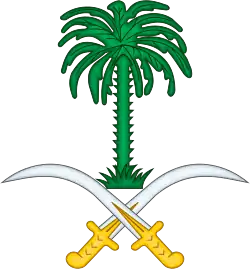2015 Mina stampede
On 24 September 2015, an event described as a "crush and stampede"[5] caused deaths estimated at well over 717 pilgrims, suffocated or crushed during the annual Hajj pilgrimage in Mina, Mecca, Saudi Arabia, making it the deadliest Hajj disaster in history.[5][6][7] Estimates of the number of dead vary; the Associated Press reported 2,411 dead,[1][8] while Agence France-Presse reported 2,236 killed.[3] Based on the total of the individual national reports cited in the table below (nationalities of victims), at least 2,431 people died.[note 1] The government of Saudi Arabia officially reported two days after the event that there had been 769 deaths and 934 injured.[1][9][10] These figures remained official at the time of the following year's Hajj and were never updated.[4] The largest number of victims was from Iran, followed by Mali and Nigeria.[11]
 The way to Jamaraat Bridge (2011) | |
| Date | 24 September 2015 |
|---|---|
| Time | 09:00 AST (UTC+03:00) |
| Location | Mina, Mecca, Saudi Arabia |
| Coordinates | 21°24′59.5″N 39°53′04.9″E |
| Cause | Disputed |
| Deaths | Estimates: 2,411 (AP)[1] 2,070 (Reuters)[2] 2,236 (AFP)[3] 2,431 (Total/National) 769 (Saudi government)[1][4] |
The crush took place in Mina at the intersection of streets 204 and 223 leading up to Jamaraat Bridge.[12] The cause of the disaster remains in dispute.[13][14] The Mina disaster inflamed tensions between regional rivals Saudi Arabia and Iran, which were already elevated due to the wider turmoil in the Middle East, such as the Syrian Civil War and Yemeni Civil War.[15][16][17] In a press conference held on the day of the incident, Saudi Ministry of Interior spokesman Mansour Al-Turki attempted to address most issues regarding the incident. He said in September 2015 that an investigation was ongoing, and that the exact cause of the overcrowding that led to the deadly crush had not yet been ascertained.[18][19]
Background
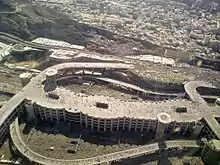
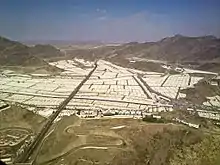
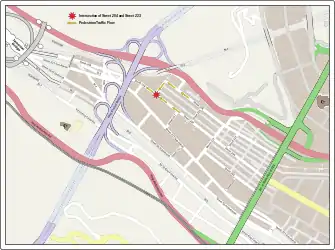
The Hajj is an annual pilgrimage in Mecca prescribed as a duty for Muslims to undertake at least once in their lifetime if they can afford to do so physically and financially.[20][21] As traditionally performed, the Hajj consists of a series of rites including the Stoning of the Devil (Arabic: رمي الجمرات ramī aj-jamarāt)[22][23] which takes place at the Jamaraat Bridge in Mina, a district a few miles east of Mecca. The Jamaraat Bridge is a pedestrian bridge from which pilgrims can throw pebbles at the three jamrah pillars. The stoning ritual is the last major ritual and is often regarded as the most dangerous part of the Hajj, with its large crowds, confined spaces, and tight scheduling.[24][25]
The 2015 Hajj took place against a background of regional turmoil (including wars in Syria, Iraq, Yemen, and Libya), the highest temperatures in Mecca in 20 years, the threat of MERS,[26] and pre-existing tensions between Saudi Arabia and Iran.[27]
A number of Hajj-related crowd crush disasters have occurred in the past,[28] with 1,426 people being suffocated and trampled to death in a 1990 tunnel tragedy, and at least 701 people killed in crowd crushes between 1991 and 2005.[29] 346 people were killed in a similar Jamaraat incident in 2006, which prompted the Saudi government to improve the infrastructure of the city and its procession routes.[30]
The Saudi Arabian government has been spending $60 billion to expand the Grand Mosque which houses the Kaaba, and has deployed 100,000 security forces and 5,000 CCTV cameras to monitor the crowds.[31] The Saudis have also built a permanent tent city in the Mina valley. It is covered with approximately 160,000 air-conditioned tents across multiple campsites (grouped by nationality) for use by Hajj pilgrims.[32]
Disaster
| Nationality | Dead | Missing | Ref. |
|---|---|---|---|
| 2 | 6 | [33] | |
| 46 | 3 | [34] | |
| 137 | 53 | [35] | |
| 52 | 41 | [36] | |
| 22 | 7 | [37] | |
| 1 | 6 | [38] | |
| 106 | 28 | [39][40] | |
| 52 | 50 | [41] | |
| 4 | 0 | [42] | |
| 2 | 3 | [43] | |
| 190 | 45 | [44][45] | |
| 53 | 0 | [46] | |
| 2 | 0 | [47] | |
| 17 | 17 | [48] | |
| 114 | 10 | [49] | |
| 129 | 0 | [50] | |
| 464 | 0 | [51] | |
| 1 | 0 | [52] | |
| 52 | 7 | [53] | |
| 2 | 1 | [54] | |
| 12 | 0 | [55] | |
| 1 | 0 | [56] | |
| 10 | 7 | [57] | |
| 1 | 0 | [58] | |
| 312 | 34 | [59][60] | |
| 5 | 0 | [61] | |
| 42 | 1 | [62] | |
| 6 | 5 | [63] | |
| 1 | 0 | [64] | |
| 78 | 41 | [65] | |
| 274 | 43 | [66][67] | |
| 1 | 0 | [68] | |
| 83 | 7 | [69][70] | |
| 1 | 0 | [71] | |
| 62 | 0 | [72][73] | |
| 8 | 0 | [64] | |
| 1 | 1 | [74] | |
| 30 | 2 | [75] | |
| 32 | 7 | [76] | |
| 15 | 0 | [77] | |
| 7 | 0 | [78] | |
| 1 | 2 | [79] | |
| Total | 2,431 | 427 | |
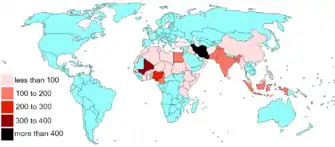
According to a statement by the Saudi civil defence directorate, the stampede occurred Thursday 24 September 2015 at 09:00 Mecca time (06:00 UTC) at the junction between street 204 and 223 as pilgrims were en route to the Jamaraat Bridge. The Saudi Interior Ministry stated that the stampede was triggered when two large groups of pilgrims intersected from different directions onto the same street.[30] The area was not previously identified as a dangerous bottleneck.[80] The junction lay between two pilgrim camp sites.[81] The International Business Times reported that the governor of Mecca Province and Saudi Arabia's head of the central Hajj committee, Prince Khalid bin Faisal Al Saud, blamed the crush outside the holy city on "some pilgrims with African nationalities";[82] prompting condemnation from several African leaders.[83]
Press TV reported that an Iranian survivor of the Mina incident, whose name was not revealed, said only a handful of Saudi soldiers assisted those being trampled in the crush. "When I returned to the disaster point to help, Saudi soldiers prevented me from entering the area. This, as only a handful of Saudi soldiers were helping the victims, while a large number of them were standing by idly and looking," the man told Press TV. A number of other survivors have also shared similar accounts, saying that mismanagement by the Saudi authorities and a poor rescue response complicated the situation.[84]
In a press conference held the day of the incident, spokesman of the Ministry of Interior Mansour Al-Turki attempted to address the incident. He said that an investigation was ongoing, that the exact causes for crowding that led to the deadly stampede on Mina Street 204 are yet to be ascertained.[18][19] He explained that "Street number 204 is a road leading from the camps to the Jamarat Bridge. What happened was that a group of pilgrims on buses were allowed to descend onto the pathways that lead to the Jamarat Bridge at a time that wasn’t allocated to them," Al Arabiya News Channel's correspondent in Mina, Saad Al-Matrafi said. "As they neared the area, they converged with an existing group of people who were already in the area, which pushed the area to over capacity." [85]
One day after the Mina crush tragedy,[86] Saudi media publicized a statement by the Grand Mufti of Saudi Arabia, Abdul-Aziz ibn Abdullah Al ash-Sheikh, exonerating Crown Prince Muhammad bin Nayef (known as "MBN") from responsibility for the disaster, as his Interior Minister title holds him accountable for safety issues at the Mecca shrine. The Grand Mufti's statement, which characterized the incident as "beyond human control", "inevitable", and attributable to "fate",[86] immunized MBN against possible domestic criticism.[87]
Casualties
The exact casualty figure for the Mina crowd collapse is disputed. The Saudi government officially reported 769 deaths,[1] a figure that did not change, while Iranian media sources have proposed figures as high as 4,173.[88] Independent estimates range between 2,236[3] and 2,431 (see nationalities of victims table) people killed, with the most recent Associated Press estimate giving a death toll of 2,411, based on "media reports and officials comments from 36 of the over 180 countries that sent citizens to the hajj".[1]
Estimates of the injured and missing also vary greatly; Saudi reports claim 934 injured;[9] Iranian reports are much higher, estimating more than 2,000 injuries.[89] On the day of the disaster, the Saudi Civil Defence directorate stated that casualties were of multiple nationalities and announced the deployment of 4,000 personnel to the stampede site alongside 220 emergency response units.[81] Pilgrims were redirected away from the stampede site,[18] and the Saudi Red Crescent Authority was mobilised.[30] Medics at Mina's emergency hospital said they alone received almost 700 people on the day of the incident. The eight hospitals around the Hajj landmarks and the six main hospitals in the city of Mecca were operating at full capacity after the stampede, medics said.[90]
By 2 October 2015, the Saudi Arabia Health Ministry stated they had completed the DNA profiling of all unidentified pilgrims who were killed or injured in the crush.[91] DNA samples of the next of kin of Hajj stampede victims were collected at Al-Nour Specialist Hospital, Mecca.[92]
Prominent victims
- Ghazanfar Roknabadi, an Iranian diplomat who served as Iranian ambassador to Lebanon from 2010 to 2014, was missing, and confirmed dead on 25 November 2015. Iran's ISNA news agency reported that the body of Roknabadi, who had been reported as missing, was identified via DNA testing and visual confirmation by two of his brothers. While some Iranian officials had said Roknabadi was alive and had been kidnapped by Saudi Arabia under cover of the Mina crush, Iranian news sources (PressTV and Mehr News Agency) reported that he died in the crush.[93][94][95] Iran stated it would conduct independent medical tests to determine whether Roknabadi did die in the Mina disaster.[3]Saudi Arabia had initially denied that Roknabadi was present at the 2015 Hajj. Iranian Foreign Ministry Spokeswoman Marzieh Afkham, on 28 September 2015, referring to Saudi media reports that say they have no official record of the entry of Ghazanfar Asl Roknabadi into the kingdom, described the reports as "incorrect" and "hasty", saying the ministry has documents showing that Riyadh had approved an ordinary Hajj visa for the dead diplomat.[96] Iranian media also released footage on 29 September 2015, showing Roknabadi's presence in Mina.[97] The passport showing his entrance into Saudi Arabia was also released by Iranian media.[98]
- Adeola Maurufudeen Adefolabi, from Lagos, Nigeria, was a one-term member representing Ifako-Ijaiye in the lower chamber of the National Assembly and former chairman of Ifako Ijaiye and Ojokoro Local Government Areas.[99][100]
- Tijani El-Miskin was a professor of Islamic Studies at the University of Maiduguri and a former head of special training course for the students of Arabic studies at the University of Maiduguri in Gamboru. He also was the Chairman of the Borno State Pilgrims Board.[101]
- Hajiya Bilkisu Yusuf was the first female editor from the northern part of Nigeria. She studied political science in Nigeria and the United States and journalism in Russia. After that Bilkisu Yusuf pursued a successful career in journalism in Nigeria, working for the Daily Trust and Leadership newspapers and several local editions in Kano and Kaduna states.[101]
- Mufti Mohammed Farooq, a prominent Indian Islamic scholar who was to perform Hajj, has been missing since the stampede. Farooq, a senior religious scholar, is a prolific writer and has authored over 50 books on a range of subjects, including Hadith and Fiqh, in Urdu and Hindi. He is the founder and principal of the Jamia Mahmoodia school in Meerut.[102]
Other prominent victims included:
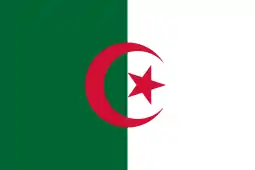 Algeria: M. Djaâfar—Husband of Algerian Minister for Family and Women Nouara Saâdia[103]
Algeria: M. Djaâfar—Husband of Algerian Minister for Family and Women Nouara Saâdia[103]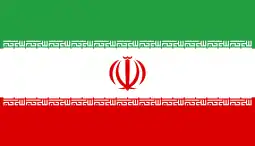 Iran:[104][105][106]
Iran:[104][105][106]
- Ahmad Fahima—Senior Iranian diplomat[107] – First Secretary to the Holy See
- Mohammad sadeq akhavan—Deputy Director of the Centre for Dispute Resolution Councils Iran's judiciary[108]
- Mohammad Rahim Aghaeipour—Iranian Diplomat, Ambassador to Slovenia
- Mohsen Haji Hassani Kargar—reciter of Qur'an a world winner of International Quran Recital Competition in 2015
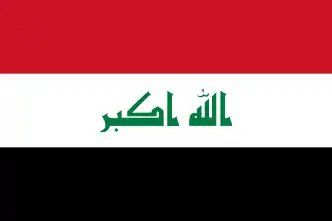 Iraq: Ismail Hamid Zair—Brigadier, Baghdad Crimes Unit[52]
Iraq: Ismail Hamid Zair—Brigadier, Baghdad Crimes Unit[52] Nigeria:[109][110][111][112]
Nigeria:[109][110][111][112]
- Musa Hassan Alkali—Justice, Nigerian Court of Appeal
- Bello Gidan Hamma—Chairman, Illela Local Government Area
- Abdulkadir Jega—Justice, Nigerian Court of Appeal
- Shehu Kontagora—Niger State Accountant General
- Faisal Musa—Member, Katsina State House of Assembly
- Abbas Ibrahim Sambo—Emir of Zing
- Abdullahi T. Yeldu—Member, Kebbi State House of Assembly
- Bilkisu Yusuf—Journalist
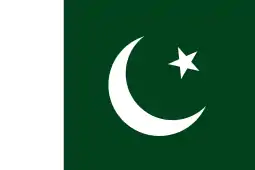 Pakistan: Assad Murtaza Gilani—Former Pakistani Member of Parliament[113]
Pakistan: Assad Murtaza Gilani—Former Pakistani Member of Parliament[113]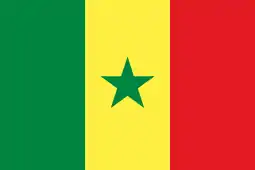 Senegal:[114][115]
Senegal:[114][115]
- Gnilane Diouf—Mother of footballer Mame Biram Diouf
- Abdoulaye Diaw—Senegalese National Technical Director, Football
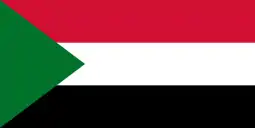 Sudan: Talaat Abdel-Razeq—Sudanese Major General, Air Defense Commander[116]
Sudan: Talaat Abdel-Razeq—Sudanese Major General, Air Defense Commander[116]
Eyewitness accounts
Early eyewitnesses' accounting stated that the crush was caused by the closure of the eastern part of Street 206, which forced pilgrims to travel up Street 223, colliding with a mass of people moving the opposite direction on Street 204.[117]
Alhaji Samaila Dabai Yombe, Deputy Governor of the Nigerian state of Kebbi, who was present at the incident, stated that the deaths happened due to a blockage of the route to Jamaraat Bridge. "What actually happened was that all the pilgrims scheduled to throw Jamrat at that time were channeled to one particular street. At a time we got to a certain point around 8:00am, a military vehicle was set across to create a barrier and then some of the Saudi soldiers were standing by, suggesting that you cannot go beyond that point. [...] About 5,000 people coming from the same direction were not aware of the road block in front, which resulted to a tight and stationary human traffic, which made it very difficult for us to even stand. So, we continued to squat to make room for fresh air while the temperature was about 47 degrees Celsius. [...] Pilgrims, in efforts to get fresh air, attempted to scale fences of tents on both sides of the road. Very few succeeded, while most people just succumb to the situation. It was at this juncture that we saw dead bodies piling up around us".[118]
Ishaq Akintola, a Nigerian Professor of Islamic eschatology, gave an eyewitness account of the disaster: "on that fateful day, we found out that some of those who had thrown their own stones made a U-turn instead of moving ahead to take a detour. They came through the route meant for entrance and not exit. They came towards us. They were in a very large group and the road was not spacious enough to allow a free flow of those of us coming to throw stones at the Devil and those who had stoned the Devil. The road could not take those coming and those going. And I discovered that most of those who took the wrong way were Egyptians".[119]
Investigation
Saudi official statements
In a statement released by the Saudi embassy, Foreign Minister Adel al-Jubeir stated, "The Custodian of the Two Holy Mosques has directed to launch a thorough investigation that will be transparent [...] We will reveal the facts when they emerge, and we will not hold anything back. If mistakes were made, those who made them will be held accountable, and we will make sure that we will learn from this in order to ensure that it doesn’t happen again."[120]
Saudi Crown Prince Muhammad bin Nayef is overseeing the official investigation. Saudi newspapers reported that on October 18, 2015 bin Nayef had spoken to the investigators and urged them to "continue their efforts to find the causes of the accident, praying to Allah Almighty to accept the martyrs and wishing the injured a speedy recovery." However, Saudi Arabia has not yet released any findings by their investigators.[121]
Prompted by difficulties in identifying bodies after the Mina disaster, Saudi Arabian Deputy Minister of Health, Dr. Hamad Al-Duwailie, announced plans to require all Hajj pilgrims to wear an electronic bracelet containing identity information. Al-Duwailie also said that Saudi Ministry of Health would upgrade its current Hajj and Umrah committee a permanent coordinating body within the Ministry.[122] In January 2016, the Saudi Shura Council recommended "raising the capacity of roads leading to the Jamarat facility, and to the accommodation areas in Mina" as well as more studies on Hajj-related transportation flow.[123]
Recommendations by independent experts
Najmedin Meshkati, Professor of Engineering and International Relations at the University of Southern California, who is an expert in accident investigation, recommended in a self-authored opinion piece in the World Post that, "the Saudi government should embark on the immediate creation of an independent investigation commission/panel. This interdisciplinary commission/panel should be chaired by a nationally renowned Saudi statesman or scholar, with members selected from Saudi Arabia and affected countries based on their technical expertise and to include responsible governmental entities, first responder agencies, and academics of requisite disciplines for accident investigation. [...] And it should be empowered by the subpoena power and charged to conduct a comprehensive, systematic and interdisciplinary investigation by employing the system-oriented, robust 'AcciMap' methodology to write the most technically-sound report on the root-causes of this tragedy".[124]
Amer Shalaby is a Professor of Civil Engineering at the University of Toronto's Transportation Research Institute, former Hajj pilgrim, and consultant to Saudi government on crowd management. Shalaby, who specializes in transportation planning for large-scale events, proposes using "smart phones and other static and dynamic sensors" to provide authorities real-time information that could identify potential hot spots during the Hajj. He also suggests that "some of the effective methods of highway traffic flow management, such as flow metering, could be adapted for streamlining crowd flows in Mecca."[125]
Keith Still, Professor of Crowd Science at Manchester Metropolitan University in Britain, who helped redesign the Jamaraat (the pillars representing the devil stoned by pilgrims) after a disaster in 2004, said there was criticism at the time that the upgrades at the Jamaraat had not been extended to other areas. He said "For complex systems that flow in and out, if you make one change along the way it can have knock-on and ripple effects elsewhere. Change any one part of system with 3 million people, and there's a danger of an accident like this."[80]
Mohammed Ajmal, a physician specializing in Emergency Medicine and former manager of a medical center set up to treat Indian Hajj pilgrims, details issues with both the design of the Mina tent city and quick access to disaster medical care at the site. Ajmal points to structural design flaws in Mina, calling it a "badly designed death trap—in times of disaster" as it attempts to funnel tens of thousands of people through T intersections, such as the junction of Streets 204 and 223 where the crush took place. Compression asphyxia is the cause of death for most victims of a crowd collapse, and can occur in within ten minutes; Ajmal notes that Mina's design prevents medical care from arriving within that time frame stating that people at crush site with the commonly seen crowd flow pattern are "destined to die" within minutes before any medical help can reach the site.[126]
Reactions
Governments
In the wake of the Mina disaster, many world leaders sent messages of sympathy and consolation, including German Chancellor Angela Merkel, Qatari Prime Minister Abdullah bin Nasser bin Khalifa Al Thani, King Mohammed VI of Morocco, Kuwaiti Emir Sabah Al-Ahmad Al-Jaber Al-Sabah, Pakistani President Mamnoon Hussain, and Tunisian President Beji Caid Essebsi.[127]
- Minister of Religious Affairs and Endowments, Mohamed Aissa, said "We do not doubt the reliability of the security system set up by the Saudi government. We do not deny, either, that the Saudi kingdom is the sole organizer of the Hajj, for several years. However, we will require that the whole matter be clarified and that those responsible for this disaster are known and sanctioned. We will demand compensation for the families of the deceased and for the injured".[128]
- Religious Affairs Secretary Chowdhury Md Babul Hassan came down heavily upon the Saudi government for its "disrespectful handling" of the bodies after 24 September incident at Mina. "The way the Saudi security officials removed the bodies from the site seemed as if they were dumping garbage. The stampede has laid bare the Saudi authorities' mismanagements," he said.[129]
- Indian President Pranab Mukherjee stated via Twitter that he was "deeply saddened by tragic incident at Mina Thursday, during which a large number of hajj pilgrims lost their lives" and that he offered "my sincere condolences to government of Saudi Arabia and families of the deceased pilgrims. I also wish speedy recovery to injured".[130]
- Indian Prime Minister Narendra Modi said "Distressing news from Mecca. Pained at loss of lives due to the stampede. Condolences to families of the deceased and prayers with the injured".
- Indonesian officials criticized Saudi Arabia's response to the disaster, saying authorities in the kingdom prevented their diplomats from seeing initial data and blocked their immediate access to the dead.[131]
- Indonesia officially offered assistance to help Saudi Arabia in identifying bodies of hundreds of hajj pilgrims killed in Thursday's stampede during the conduction of a hajj procession in Mina, a statement released by Indonesian Foreign Affairs Ministry.[132]
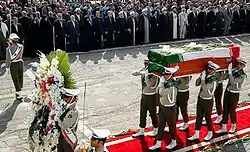
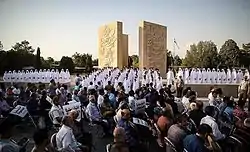
- Ali Khamenei, Supreme leader of Islamic Republic of Iran, declared three days of national mourning in Iran. "The Saudi government is obligated to shoulder its heavy responsibility in this bitter incident and meet its obligations in compliance with the rule of righteousness and fairness. Mismanagement and improper measures that were behind this tragedy should not be overlooked," Khamenei said.[133] He threatened Saudi Arabia with a "tough and harsh" response after complaining that "the bodies of Hajj stampede victims are not being repatriated swiftly".[134] Ali Khamenei also demanded of all Islamic countries to challenge the management of Mecca and Medina.[135]
- Hassan Rouhani, the President of Iran, in his address to the seventieth UN General Assembly said the feelings of millions of Muslims being hurt by the incident amounts to spiritual loss which cannot be compensated for simply by material means. "The public opinion demands that Saudi authorities discharge, without delay, their international responsibility in providing immediate consular access for the quick identification and returning of the bodies [of the deceased]," said the Iranian president. He further added that "It is also required that the necessary conditions be provided for [conducting] an independent and precise inquiry into the causes of the [Mina] disaster and [working out] methods for preventing a repeat of that in the future."[136]
- Iranian Foreign Ministry summoned Saudi Arabia’s chargé d'affaires,[137] and dispatched a high-ranking delegation from the Foreign Ministry and the Iranian Red Crescent, headed by Hassan Ghashghavi, to investigate the situation.[138] Hossein Amirabdollahian, Deputy of Foreign Affairs Minister, accused Saudi officials of tactlessness over the lack of safety measures at the Hajj[139] and said "We can in no way be indifferent to this irresponsible behaviour of Saudi Arabia. This will be dealt with through diplomatic channels."[140]
- The head of Iran's Hajj organisation, Said Ohadi, accused Saudi Arabia of safety errors that caused the accident saying that "Today's incident shows mismanagement and lack of serious attention to the safety of pilgrims. There is no other explanation. The Saudi officials should be held accountable."[140]
- Khamenei’s representative on Hajj affairs, Seyed Ali Ghaziaskar, said: "Saudi officials do not let our medical team and doctors to reach the affected areas and hospitals to help."[141]
- Thousands of people marched in Tehran to protest at Saudi Arabia's handling of the hajj pilgrimage. The Iranian demonstrators carried black flags representing the deceased and chanted "death to Al Saud" (مرگ بر آل سعود), the ruling royal family of Saudi Arabia.[64]
- Tammam Salam, Prime Minister of Lebanon, offered his condolences, stating that he "shared the sorrow with the Iranian nation and officials of the Islamic Republic".[142]
- Hassan Nasrallah, the Secretary General of Hezbollah said that the Saudi regime holds the full responsibility for the Mina incident as it was the sole manager of the pilgrimage and it has always refused to share this responsibility with anyone else. He stressed that blaming the pilgrims for this tragedy was a simplification of things, and that the consequent accidents in the pilgrimage that take place every year indicate that there is a major problem in Saudi’s management.[143] He further said Saudi Arabia should allow Muslim countries to help the kingdom run the Hajj pilgrimage rituals, emphasising the need for the formation of a Muslim committee to "supervise the management" of the annual Islamic event. He also added that a group of Muslim countries should be formed to probe the fatal stampede during Hajj rites.[144]
- The Nigerian government has dismissed remarks by the Saudi health minister blaming pilgrims for "not following instructions."[145]
- Abdullahi Mukhtar, the Chairman of National Hajj Commission of Nigeria said, "It was not fair for anyone to blame Africans participating at the pilgrimage for the fatal incident" and called on the Saudi authority to include Nigeria in a government investigation into the incident.[146]
- Nigeria's Emir of Kano, Alhaji Muhammad Sanusi II said he would advise Nigerians not to participate in the Stoning of the Devil unless they are assigned quarters close to the Jamarāt pillars. Citing Qur'anic verses and teachings of Muhammad, Sanusi stated that omitting the Stoning of the Devil rite does not lessen the validty of the Hajj pilgrimage. Further explaining his reasoning, Sanusi said, "During the era of Prophet Muhammad, he permitted pilgrims who came on camels to stay in Makkah after Arafat, instead of staying in Mina and sleeping at Muzdalifa. So, if the Prophet can give such grace to some people, just to protect their animals, why didn’t our scholars educate our people properly to avoid this untoward hardship and death" and that "If one deliberately refuses to even perform the stoning of the devil ritual, all he needs to do is just to slaughter a ram in order to make up for the loss. So, if this is the situation, why do we go and suffer and die instead of sacrificing a ram?"[147][148][149]
- Members of the Nigerian House of Representatives condemned the stampede in Mecca during which several lives were lost. The House also demanded the immediate take-over of the investigation of the incident by international investigators since there were still conflicting reports as to the cause of the incident. It stated that this was necessary in order to prevent future occurrences. During the tragedy, 54 Nigerians lost their lives. One member of the House, Honourable Igbokwue, pointed out that if nothing concrete was done to establish the cause of the stampede, it would definitely happen again.[150]
- The Sultan of Sokoto, Alhaji Sa’ad Abubakar III, urged Saudi authorities to henceforth provide improved safety measures during the annual pilgrimage to Mecca.[151]
- Sani Yahaya Jingir, chairman of Nigeria's National Ulama'u Council, called on Nigerian government to work with Saudi Arabia to investigate the cause of the incident, and to take action to prevent similar future crowd collapses.[152]
- The New York Times reported that, amid public criticism of the Saudi and Pakistani governments for weaknesses in the official response to the tragedy, the Pakistani government has directed private television networks to "avoid criticizing the Saudis in news programs and talk shows." Pakistani lawmaker Tariq Fazal Chaudhry has defended his government's position, saying the directive was meant to prevent broadcasts from "giving the tragedy a sectarian color."[153]
- Opposition demonstrated a walk-out from the Pakistani Senate against the government’s attitude towards Mina stampede. Senator Aitzaz Ahsan said that the ruling party is trying to forget the issue by suppressing it. He said that the government has left Pakistani pilgrims alone in tough times and is trying to cover the situation though Pakistan Electronic Media Regulatory Authority (PEMRA). The Deputy Chairman said that the nation should wait for investigative report by Saudi Arabia. There must not be any politics over Mina stampede, he added.[154]
- Saudi Arabia's Foreign Minister Adel al-Jubeir has accused Iran of "playing politics" with the disaster and called on the Islamic Republic to await the outcome of an investigation ordered by Saudi Arabia's King Salman.[155]
- The governor of the Makkah Region and head of the Central Hajj Committee Prince Khaled al-Faisal blamed the stampede on "some pilgrims from African nationalities."[81] Saudi officials have also blamed pilgrims for the stampede, suggesting some had "moved without following instructions by the relevant authorities".[156] The Saudi health minister Khalid A. Al-Falih stated that the stampede occurred due to pilgrims failing to follow official directions, adding that timetables established by authorities were ignored.[30] However, witnesses dispute this, according to The Guardian.[157]
- King Salman removed three high-level officials from their posts following the stampede.[158]
- Saudi Arabia Mufti Abdul-Aziz ibn Abdullah Al ash-Sheikh called Iranian people and government non-Muslims and enemies of Islam. He made these comments after Iran's Ayatollah Ali Khamenei said Saudi management of Makkah and Medina should be challenge.[135]
- In steering committee, the Senegalese Democratic Party (PDS) called for the resignation of the government led by Dionne Muhammad Abdallah Boun. Liberals believed that the state authorities have not been up in the "management" of Mina stampede.[159]
- State-controlled news agency Syrian Arab News Agency said, "The stampede raised questions about the Saudi government’s attention to pilgrims’ safety despite billions of dollars that Saudi authorities claim to spend to improve Hajj."[160]
- Mehmet Görmez, the head of Presidency of Religious Affairs blamed serious management issues at Mecca,[161] saying, "There was serious negligence by authorities in directing the crowd."[162]
- Though AKP Deputy Chair Mehmet Ali Şahin also criticised the Saudi organisation,[163] Turkey's President, Recep Tayyip Erdoğan defended the Saudi government saying, "I do not sympathise with the hostile statements against Saudi Arabia."[164] He asserted, "It is not right to have the approach of putting the blame on Saudi Arabia. On the contrary, during the Hajj and Umrah I participated in, I came to observe closely the level of sensibility in the organization work conducted there. Therefore I cannot say ‘the organization is wrong’."[165]
- During a one-on-one meeting at the UN General Assembly, Russian President Vladimir Putin personally expressed his condolences to Iranian President Hassan Rouhani and to the families of Iran's deceased Hajj pilgrims.[166] Putin had earlier sent condolences to Saudi King Salman expressing his "compassion to the families and relatives of the dead and wished an early recovery to the injured".[167]
- United Kingdom Prime Minister David Cameron tweeted that his "thoughts and prayers are with the families of those killed at the Hajj pilgrimage."[168]
- UK opposition Labour Leader Jeremy Corbyn stated that he was "shocked and saddened to hear of today's events in Saudi Arabia. My thoughts are with the friends and families of all those affected as well as Muslims in Britain and around the world."[168]
- United Nations Secretary-General Ban Ki-Moon stated that he "was deeply saddened to learn of the death of more than 700 Hajj pilgrims and of injuries to many others as a result of a deadly incident in the Mina Valley in the Kingdom of Saudi Arabia."[168]
- Ned Price, spokesman for the United States National Security Council, speaking on behalf of the Obama administration, said "the United States expresses its deepest condolences to the families of the hundreds of Hajj pilgrims killed and hundreds more injured in the heartbreaking stampede in Mina, Kingdom of Saudi Arabia. As Muslims around the world continue to celebrate Eid al-Adha, we join you in mourning the tragic loss of these faithful pilgrims."[168]
- Pope Francis, leader of the Roman Catholic Church, expressed his "sentiments of closeness in the face of the tragedy that their people suffered today in Mecca."[169][170][171]
Non-governmental
- Grand Mufti Sheikh Abdul-Aziz ibn Abdullah Al ash-Sheikh, Saudi Arabia's top religious leader (appointed to his position by King Fahd in 1999), told Saudi Arabia's Crown Prince and Minister of the Interior, Muhammad bin Nayef, "You are not responsible for what happened. As for the things that humans cannot control, you are not blamed for them. Fate and destiny are inevitable".[86][172]
- Irfan al-Alawi, the executive director of the Islamic Heritage Research Foundation, said that "the disaster was a result of poor management by the government, given the number of past disasters."[173]
- Madawi al-Rasheed, a Saudi-Arabian anthropologist and visiting professor at the London School of Economics, said: "There is no accountability. It's shocking that almost every year there is some kind of death toll. The renovation and expansion are done under the pretext of creating more space for Muslim pilgrims, but it masks land grabs and vast amounts of money being made by the princes and by other Saudis. Officials in the kingdom had avoided responsibility in part by citing the Islamic doctrine that anyone who dies during the pilgrimage goes to heaven."[173]
- Ali al-Ahmed, a Saudi analyst and current director of the Washington, DC-based Institute for Gulf Affairs think tank blamed the Saudi government's "mismanagement" of the Hajj, saying that "the Ministry of Interior's use of soldiers who have no clue or expertise in managing crowds was the real cause of stampedes. This really has to do with the failure of the Saudi government in organizing this Hajj, and they need to get help from around the world."[174]
- Saeed al-Shehabi, a London-based political activist in an interview with Iranian-based television Press TV said that, "In Saudi Arabia; it is good the Saudis are good at war, are good at financing terrorism and extremism, they are bombing Yemen days and nights, yet they cannot manage this annual festival where Muslims are expected to exercise their worship in peace and in harmony and also to discuss their own lively matters that concern Muslims."[175]
- Salman al-Ouda, a Saudi cleric said that "Riyadh regime should be held accountable for the crush, adding that Saudi rulers cannot evade their responsibility by labeling the tragedy as an act of God." He called on media outlets to cover the incident with full transparency.[176]
- Yasmin Alibhai-Brown, a Ugandan British author and journalist, seized upon the incident to blast Saudi Arabia for its human rights violations and funding violent Wahhabism in the world. She criticized the Saudi government for blaming the victims in the incident and added "Mecca was once a place of simplicity and spirituality. Today the avaricious Saudis have bulldozed historical sites and turned it into the Las Vegas of Islam – with hotels, skyscrapers and malls to spend, spend, spend. The poor can no longer afford to go there. Numbers should be controlled to ensure safety – but that would be ruinous for profits." She also added that Western leaders are not willing to confront Saudi Arabia because of oil and profits made by arm sales.[177]
- Abbass Schumann, the Undersecretary of Al-Azhar, Egypt, said that allegations of negligence concerning Saudi's administration and handling of the hajj are "unacceptable". Schumann called for patience pending the conclusion of the investigation by Saudi Arabia, and cautioned against rushing to judgment.[178]
- Egyptian physician and feminist writer Nawal El Saadawi said "They talk about changing the way [the hajj] is administered, about making people travel in smaller groups. What they don't say is that the crush happened because these people were fighting to stone the devil. Why do they need to stone the devil? Why do they need to kiss that black stone? But no one will say this. The media will not print it. What is it about, this reluctance to criticise religion? ... This refusal to criticise religion ... is not liberalism. This is censorship".[179]
- Vijay Prashad, Northampton-based journalist and historian, said that survivors told journalists that Saudi's response to the tragedy was "too little, too late," stressing that Saudi rescuers arrived almost two hours after the incident. ... much of Mecca, like Saudi Arabia in general, is designed for the VIP and the VVIP. Embarrassingly, Riyadh provides little if any care to ordinary people and it is not the first time that Saudi Arabia has demonstrated disdain for the lives of Muslims. Instead of pouring money into the war, Riyadh should use its wealth to make the Hajj safe not only for the VIPs, but for millions of ordinary Muslims.
- Citing the rumors about the block, Basma Attasi, the reporter from Al Jazeera who was present in the ritual, explained "For those who know the area where the stampede occurred, this report seems far from reality. The relatively humble area is far from the entrance to Mina and houses ordinary pilgrims arriving from outside of Saudi Arabia. Important personalities stay in areas close to the entrance and their convoys are assigned separate tunnels and roads to facilitate their movement."[90]
- Moussa Mara, former Prime Minister of Mali, said that "the Divine Will must be evoked after objective analysis, not before. Otherwise no corrective action will be taken and, one day, the same causes will produce the same effects" and called for a thorough investigation and analysis of the Mina crush so as to reduce or eliminate the possibility of such disasters happening again in the future.[180]
- Toby Craig Jones, professor of Middle Eastern history at Rutgers University told The New York Times that he was "not surprised at the Saudi reluctance to give information on what could be a catastrophic case of negligence". Jones stated that the Saudis "want to say it's a technical problem, that order broke down because the victims were unruly. But what if the opposite were true – that the Saudis haven't created a safe environment for the hajj? For the Saudis to be open and honest about what happened would require them to admit it's not a technical problem at all."[181]
Unconfirmed reports
Saudi royal convoy
Lebanon-based Arabic-language daily Ad-Diyar reported that a convoy escorting Mohammad bin Salman Al Saud, Deputy Crown Prince and Saudi Minister of Defense, composed of 200 soldiers and 150 police officers triggered the disaster by blocking a street forcing pilgrims to turn around against the flow of traffic. Ad-Diyar also alleged that the Deputy Crown Prince and entourage swiftly left the scene, and that the Saudi authorities sought to impose a media blackout on reporting the Prince's presence in the area.[182]
Iranian media reported the Ad-Diyar story,[183] and Iranian Hajj officials stated that two streets near the disaster point had been sealed for "unknown reasons",[184] while the Iranian Fars News Agency, quoted a member of the Iraqi parliament, Hassan Salem, as saying "the Mina disaster was an engineered tragedy to kidnap the Iraqi and Iranian officials on the pretext of the Mina incident."[185] A reporter with the BBC's Hausa Service, Yusuf Ibrahim Yakasai, confirmed that at least one road leading to the Jamaraat was blocked.[186] Saudi officials denied the reports,[64] stating diplomatic convoys take place in the south of Mina and in tunnels, while the incident took place in the north.[187]
Beheadings of responsible officials
The Saudi government was reported to have beheaded 28 people found responsible for the disaster.[188]
Killing of the injured
Iran's leader Ayatollah Ali Khamenei accused the Saudis of killing injured pilgrims by putting them in containers along with the dead.[189]
Aftermath
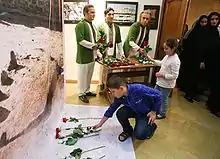
The 2015 Mina Crush disaster has increased tensions in the already-strained relationship between Saudi Arabia and Iran,[17][64][155][190] led to calls from politicians in a number of Muslim nations for changes in oversight of Mecca and the Hajj,[163][191][192] and bolstered opposition to King Salman among the senior members of the Saudi Arabian royal family.[193][194]
Criticism of Saudi control of Hajj
Politicians and religious leaders in a number of Muslim countries have cited the 2015 Mina Crush disaster as reason for control of the Hajj be handed over to either a different nation or to a pan-Islamic organization.[191] Mehmet Ali Sahin Deputy Chair of Turkey's Justice and Development Party (AKP) criticised the Saudi organisation, and claimed that Turkey could do a better job than Saudi Arabia at organising the Hajj pilgrimage, calling for Turkey to be entrusted with its management.[163] Nouri al-Maliki, former Prime Minister of Iraq, proposed that the Organisation of Islamic Cooperation (OIC) should take over administration of the Hajj.[195] Mohammad Emami Kashani, an Iranian Ayatollah, also called for transfer of the control of the Hajj to the OIC,[196] stating "Saudi Arabia is incapable of organising the pilgrimage. The running of the Hajj must be handed over to Islamic states."[197] Hassan Nasrallah, Secretary General of Hezbollah stated that Saudi Arabia should allow Muslim countries to help the kingdom run the Hajj pilgrimage rituals, emphasising the need for the formation of a Muslim committee to "supervise the management" of the annual Islamic event.[144] The Saudi government rejected such calls; Saudi Prince Turki al-Faisal stated Saudi control over the Hajj was "a matter of sovereignty and privilege and service".[192]
In 2016, supreme leader of Iran, Ayatollah Ali Khamenei sent a global message via his website severely criticizing Saudi rulers[198][199][200] for what he called "the crimes they have caused throughout the world of Islam,"[201] and asked they be held responsible.[202] In his message Khamenei described the nature of Saudi rulers as "blasphemous, faithless, dependent and materialistic," and asked "the world of Islam" to know them.[203] He demanded reconsidering the management of two holy places and the issue of hajj due to what he described as "Saudi rulers' oppressive behavior towards God's guests," referring to 2015 Mina disaster.[204][201] "Otherwise Muslims would face biggest problems," he warned.[199][200] "The hesitation and failure to rescue the half-dead and injured people... is also obvious and incontrovertible. ... They murdered them," he said.[205]
Increased Saudi–Iranian tensions
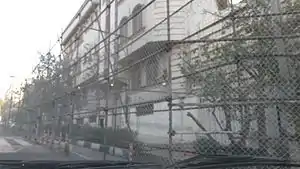
Government and religious leaders of Iran—which lost at least 464 citizens[206] in the Mina disaster—have been harshly critical of Saudi Arabia.[17] Saudi leaders have in turn have claimed that Iran is attempting to take advantage of a tragedy for political purposes.[155][207]
In the immediate aftermath of the Mina Crush, both Iran's Supreme Leader, Ali Khamenei, and Iranian President, Hassan Rouhani, had harsh words for the Saudi government and blamed Saudi Arabia for the disaster.[208] Rouhani suggested that the Mina crush could be the result of the Saudi government moving their best troops to Yemen, and leaving Hajj crowd control in the hands of less experienced soldiers.[209] While Ebrahim Raisi, Iran's State Prosecutor claimed the disaster had been caused by the Saudi officials blocking a road so as to clear a path for a Saudi convoy, and that the House of Saud should be held responsible under international law.[190][207] Iranian legal experts later decided that Iran could not bring such a case before the International Court of Justice or the International Criminal Court due to jurisdictional issues.[210] Iranian officials also accused Saudi Arabia with kidnapping Iranian diplomat, Ghazanfar Roknabadi, who went missing during the Hajj, until his body was finally identified on 25 November 2015.[93][211] On 24 November 2015, Iran announced that it was forming its own fact-finding committee to investigate the disaster.[212] Iran claims that the death toll of the disaster far exceeds what has been reported, and that between 4,700 and 7,500 pilgrims actually died.[212][213] On 4 January 2016, Iranian government spokesman Mohammad Bagher Nobakht stated that Iran would be suspending participation by its nationals in the Umrah pilgrimage to Mecca, as "conditions of safety will not be guaranteed to pilgrims".[214][215]
Saudi Foreign Minister Adel Al-Jubeir has urged Iran to wait for the results of the official Saudi investigation, stating that the Saudi government, "will reveal the facts when they emerge. And we will not hold anything back. If mistakes were made, who made them will be held accountable."[207] Saudi government officials have made few official comments addressing specific Iranian allegations, while attempting to de-escaltate tensions with Iran.[208] However, Mohammed bin Nawaf bin Abdulaziz, Saudi Ambassador to the UK, did specifically deny what he called "unfounded allegations", including accusations that a road blockage by a Saudi royal convoy caused the disaster.[216] Additionally, an anonymous Saudi official involved with management of the Hajj suggested to a reporter for Al-Monitor that Mina disaster might be the result of Iranian sabotage, and that the Iranian Hajj Mission was being investigated.[208]
Amid deteriorating diplomatic relations and following months of negotiations over visa requirements and safety logistics, in May 2016 Iran suspended participation in the upcoming Hajj scheduled for September 2016.[217] Iran previously suspended participation in the Hajj in 1988 and 1989, after 400 Iranian pilgrims were killed by Saudi security forces.[217]
Opposition to Saudi King Salman
The Mina disaster increased and emboldened opposition to Saudi King Salman. The Guardian reported after the disaster that a "senior Saudi prince has launched an unprecedented call for change in the country's leadership" writing two letters calling for his replacement.[193] The prince was quoted by the Guardian as saying "The public are also pushing this very hard, all kinds of people, tribal leaders [...] They say you have to do this or the country will go to disaster."[193] According to reports, favored to replace Salman is his younger brother, Prince Ahmed bin Abdulaziz, another son of Saudi Arabia's founding king Ibn Saud, and former Interior Minister.[194]
The likelihood of such a coup, at least in the short term,[218] and the authenticity of the prince's letter, have both been questioned.[219] However, structural economic problems, the Yemen War, and discord in the royal family all contribute to the real possibility of instability for Saudi Arabia.[193][218][220] But as the holder of the royal title "Custodian of the Two Holy Mosques", King Salman has been embarrassed by the twin disasters that bracketed the 2015 Hajj season—the Mecca crane collapse and the Mina Crush.[219]
Description as "stampede"
Some academics who study crowd movements and crushing disasters have questioned the use of the term "stampede".[29] "The rhetoric of 'stampede' is often used to imply that the crowd is animalistic or mindless, but from a crowd psychology point of view, I'm sure that there was a logical explanation for the crush", University of Sussex crowd behavioral expert Anne Templeton told Newsweek. "The density of the Hajj has been shown to reach up to 6–8 people per square meter, so I would be very surprised if a stampede (implying people running mindlessly) could occur in the first place."[221]
They argue that the Mina disaster is better described as a "progressive crowd collapse":[29][221] beginning at densities of about six[29] to seven[222] persons per square meter, individuals are pressed so closely against each other they are unable to move as individuals, and shockwaves can travel through a crowd which, at such densities, behaves somewhat like a fluid.[222] If a single person falls, or other people reach down to help, waves of bodies can be involuntarily precipitated forward into the open space.[29] One such shockwave can create other openings in the crowd nearby, precipitating further crushing.[29] Unable to draw breath, people in a crowd can also be crushed while standing.[222]
Use of the word "stampede", says Edwin Galea of the University of Greenwich, is the result of "pure ignorance and laziness … it gives the impression that it was a mindless crowd only caring about themselves, and they were prepared to crush people."[29] In reality, "people are only directly crushed by others who have no choice, and the people who can choose ... are too far away from the epicentre" to be aware of what is happening.[29] According to experts, true "stampedes" (and "panics") rarely occur except when a crowd is fleeing in fear, such as from a fire,[222] and rarely does trampling by other human beings in such "stampede" conditions result in fatal injuries.[29]
"If you look at the analysis, I’ve not seen any instances of the cause of mass fatalities being a stampede," says Keith Still, professor of crowd science at Manchester Metropolitan University. "People don't die because they panic. They panic because they are dying."[29]
See also
- 2015 Mecca crane collapse
- 1987 Mecca incident
- Incidents during the Hajj
- List of human stampedes
Notes
- This figure is based on the total of people killed from the most recent sources used to create the "Nationalities of victims" table, and is calculated from those sources by Wikipedia editors! Note that the total of all deaths reported by nation (2,431) is higher than total deaths reported by most up-to-date sources (AP: 2,411 & AFP: 2,286). Some of those killed may have held multiple citizenships or some national counts or references may be incorrect.
References
- Gambrell, Jon; Ahmed, Baba (9 December 2015). "Hajj Stampede in September Killed Over 2,400, New Count Finds". The New York Times. Associated Press. Retrieved 9 December 2015.
- "رویترز: شمار قربانیان منا سه برابر آمار ادعایی عربستان است" [Reuters: MINA: three times the number of victims claimed by Saudi Arabia's statistics]. Deutsche Welle. 13 October 2015. Retrieved 9 April 2016.
- "Iran says tests will show cause of diplomat's death in Saudi". AFP. 27 November 2015. Archived from the original on 29 November 2015. Retrieved 29 November 2015.
- "As hajj nears, questions about deadly 2015 stampede remain". Associated Press. 9 September 2016. Retrieved 8 October 2016.
- Gambrell, Jon; Ahmed, Munir; Osman, Mohamed; Batrawy, Aya; Mazen, Maram (9 October 2015). "Saudi crush was deadliest hajj tragedy ever". Yahoo! News. Associated Press. Archived from the original on 14 October 2015. Retrieved 10 October 2015.
- "Foreign toll figures show hajj tragedy deadliest in history". Yahoo! News. Agence France-Presse. 14 October 2015. Retrieved 14 October 2015.
- Gambrell, Jon; Batrawy, Aya (14 October 2015). "New tally shows at least 1,621 killed in Saudi hajj tragedy". Business Insider. Associated Press. Retrieved 14 October 2015.
- "Iran holds funeral for diplomat killed in Saudi hajj crush". Associated Press. 27 November 2015. Archived from the original on 8 December 2015. Retrieved 29 November 2015.
- "Hajj stampede: Saudi officials clarify toll after questions". BBC News. 29 September 2015. Retrieved 1 October 2015.
- Piggott, Mark (26 September 2015). "Hajj stampede death toll 'rises up to 1,100' as Saudi Arabia faces criticism over safety record". International Business Times. Retrieved 1 October 2015.
- "Mecca, Medina properties of Islam, not Al Saud: Iran". Press TV. 9 September 2016. Archived from the original on 5 July 2017. Retrieved 8 November 2016.
- "Hundreds killed in stampede at Muslim hajj pilgrimage". CBS News. Associated Press. 24 September 2015. Retrieved 1 October 2015.
- Morello, Carol (27 September 2015). "Iran demands Saudi Arabia apologize for disaster near Mecca". The Washington Post. Retrieved 1 October 2015.
- "Tehran: Mina crush was 'beyond human control'". Arab News. 2 October 2015. Retrieved 2 October 2015.
- Hubbard, Ben (25 September 2015). "Hajj Tragedy Inflames Schisms During a Pilgrimage Designed for Unity". The New York Times. Retrieved 1 October 2015.
- Black, Ian; Weaver, Matthew (25 September 2015). "Iran blames Saudi leaders for hajj disaster as investigation begins". The Guardian. Retrieved 1 October 2015.
- Tharoor, Ishaan (24 September 2015). "How the deadly hajj stampede feeds into old Middle East rivalries". The Washington Post. Retrieved 1 October 2015.
- Naar, Ismaeel (24 September 2015). "Hajj: More than 700 dead in Mina stampede". Al Arabiya. Retrieved 18 October 2015.
- Siddique, Haroon (24 September 2015). "Mecca: hajj crush kills hundreds near holy city–as it happened". The Guardian. Retrieved 29 November 2015.
- "Islamic Practices". Berkley Center for Religion, Peace, and World Affairs. Georgetown University. n.d. Retrieved 6 October 2015.
- Long, Matthew (2010). Islamic Beliefs, Practices, and Cultures. Singapore: Marshall Cavendish. p. 86. ISBN 978-0-7614-7926-0. Retrieved 6 October 2015.
- Burton, Richard Francis (1857). Personal Narrative of a Pilgrimage to El Medinah and Meccah, Volume 2. Longman, Brown, Green, Longmans, and Roberts. p. 226. Retrieved 1 October 2015.
The word jamrah is applied to the place of stoning, as well as to the stones.
- Dāʼūd, Abū (1984). Sunan Abu Dawud: Chapters 512–1337. Sh. M. Ashraf. p. 506. Retrieved 1 October 2015.
Jamrah originally means a pebble. It is applied to the heap of stones or a pillar.
- Atassi, Basma; Haddad, Mohammed (17 September 2014). "Hajj 360°". Al Jazeera. Retrieved 18 December 2015.
- Usman, Edd K. (25 September 2014). "Stoning of Satan hajj ritual in Mina fraught with ever-present dangers". Manilla Bulletin. Archived from the original on 24 December 2015. Retrieved 18 December 2015.
- M.R. (21 September 2015). "Why the haj is safer than ever". The Economist. Retrieved 1 October 2015.
- Wehrey, Frederic; Karasik, Theodore W.; Nader, Alireza; Ghez, Jeremy J.; Hansell, Lydia; Guffey, Robert A. (2009). Saudi-Iranian Relations Since the Fall of Saddam: Rivalry, Cooperation and Implication for US Policy. RAND Corporation. ISBN 978-0-8330-4657-4. Retrieved 14 November 2015.
- "Satan stoned – most dangerous hajj rite". News24. Agence France-Presse. 6 November 2011. Retrieved 1 October 2015.
- Benedictus, Leo (3 October 2015). "Hajj crush: how crowd disasters happen, and how they can be avoided". The Guardian. Retrieved 4 October 2015.
- "Hajj stampede: At least 717 killed in Saudi Arabia". BBC News. 24 September 2015. Retrieved 1 October 2015.
- Ifill, Gwen; Batrawy, Aya (24 September 2015). "Survivors question how hajj stampede spiraled out of control". PBS NewsHour. Retrieved 1 October 2015.
- "More than 300 killed in Saudi Hajj stampede". Al Jazeera. 24 September 2015. Retrieved 15 December 2015.
- Moosakhail, Zabihullah (27 September 2015). "Two of eight Afghans missing after Hajj stampede confirmed dead as death toll mounts to 769". The Frontier Post. Archived from the original on 5 October 2015. Retrieved 4 October 2015.
- "Bousculade de Mina (La Mecque): le nombre de hadjis algériens décédés s'élève à 46 (MAE)" [Scramble in Mina (Makkah): Number of Algerian Hadjis killed is now 46 (MFA)] (in French). Algérie Presse Service. 2 November 2015. Archived from the original on 4 November 2015. Retrieved 2 November 2015.
- "Hajj stampede: Bangladesh death toll climbs to 137". The Daily Star. 18 October 2015. Retrieved 27 October 2015.
- "52 morts, 41 disparus et deux blessés graves lors de la bousculade de Mina" [52 dead, 41 missing and two seriously injured in Mina stampede]. aCotonou (in French). Agence de Presse Africaine. 14 October 2015. Retrieved 27 October 2015.
- D.H. (15 October 2015). "Burkina/bousculade de La Mecque: deuil national de trois jours" [Scramble in Mecca: Three days of national mourning] (in French). Agence Nationale de l'Information. Agence France-Presse. Retrieved 27 October 2015.
- "Un pèlerin burundais décédé à la Mecque et six autres portés disparus" [One Burundian pilgrim to Mecca died and six others are missing]. StarAfrica (in French). Agence de Presse Africaine. 26 September 2015. Archived from the original on 2 October 2015. Retrieved 27 October 2015.
- Ayissi, Bertrand (28 October 2015). "Bousculade à la Mecque: Deux autres Camerounais retrouvés morts" [Stampede in Mecca: Two More Cameroonians Found Dead]. Camer.be (in French). Retrieved 2 November 2015.
- "Hajj Stampede: CPDM government trading conspiracy theories". Cameroon Concord. 17 October 2015. Archived from the original on 18 October 2015. Retrieved 27 October 2015.
- "Le Tchad perd 52 pèlerins dans la bousculade mortelle de La Mecque" [Chad loses 52 pilgrims in deadly stampede in Mecca]. China Radio International. 11 October 2015. Archived from the original on 18 November 2015. Retrieved 27 October 2015.
- "Four Chinese pilgrims confirmed dead in Hajj stampede". NewsGD.com. China News Service. 30 September 2015. Retrieved 27 October 2015.
- "Deux pèlerins djiboutiens portés disparus suite à la bousculade de la Mecque ont été retrouvés morts" [Two Djiboutian pilgrims missing following stampede in Mecca are found dead] (in French). China Radio International. 5 October 2015. Archived from the original on 14 October 2015. Retrieved 27 October 2015.
- "Egypt: Six Egyptians Return After Being Reported Missing in Haj Stampede". Aswat Masriya. 12 October 2015. Archived from the original on 13 October 2015. Retrieved 27 October 2015.
- "Number of Egyptian deaths in hajj stampede reaches 190". Ahram Online. 25 October 2015. Retrieved 1 November 2015.
- "Ethiopians killed by Hajj stampede rises to 53". StarAfrica. Agence de Presse Africaine. 20 October 2015. Archived from the original on 21 October 2015. Retrieved 26 October 2015.
- "Missing Gambian Pilgrims Confirmed Dead in Saudi Arabia". Jollof News. 26 October 2015. Archived from the original on 27 October 2015. Retrieved 26 October 2015.
- "Ghana: Hajj death toll rises to 17". StarAfrica. Agence de Presse Africaine. 20 October 2015. Archived from the original on 21 October 2015. Retrieved 26 October 2015.
- "Death toll of Indians in the Hajj stampede rises to 114, 10 missing". Global News Connect. Press Trust of India. 12 October 2015. Retrieved 26 October 2015.
- "Identification process ends, Indonesian victims in Mina incident reach 129 people". Republika Online. 17 October 2015. Retrieved 30 October 2015.
- "Bodies of all missing Iranian Hajj pilgrims identified". Tehran Times. 7 January 2016. Retrieved 7 January 2016.
- "Chief of Baghdad crimes unit died in hajj stampede". Rudaw. 27 September 2015. Retrieved 26 October 2015.
- "Bousculade de Mina: le nombre de pèlerins ivoiriens décédés passe de 14 à 52" [Mina stampede: Number of deceased Ivorian pilgrims rises from 14 to 52]. Abidjan.net (in French). Agence de Presse Africaine. 17 October 2015. Retrieved 26 October 2015.
- Ghazal, Mohammad (6 October 2015). "Jordanian missing after stampede found dead—Saudi authorities". The Jordan Times. Retrieved 26 October 2015.
- Mwakio, Philip (22 October 2015). "16 Kenyans died in Mecca stampede, Supkem says". The Standard. Retrieved 26 October 2015.
- "Lebanese imam among dead from hajj stampede". AhlulBayt News Agency. 31 October 2015. Retrieved 1 November 2015.
- "Libyan fatalities in Hajj stampede rises to 10: official". Libya's Channel. 1 October 2015. Archived from the original on 4 October 2015. Retrieved 26 October 2015.
- "One Malaysian pilgrim killed in Mina stampede". New Straits Times. Bernama. 28 September 2015. Archived from the original on 28 September 2015. Retrieved 26 October 2015.
- Salif (17 December 2015). "Mali: Bousculade meurtrière de mina: Les chiffres du ministre des Affaires religieuses" [Mali: The Deadly Mina stampede: Figures from the Minister of Religious Affairs]. MaliActu.net (in French). Retrieved 17 December 2015.
- "Bousculade Mina: le Comité de crise des agences de voyages à la Mecque envisage des tests ADN" [Mina stampede: the Crisis Committee of Mecca travel agencies considering DNA testing]. Studio Tamani (in French). 12 November 2015. Retrieved 14 November 2015.
- "Le bilan de la bousculade géante de La Mecque encore revu à la hausse" [Death toll in giant Mecca stampede revised upwards again] (in French). SFR News Réunion. 16 October 2015. Archived from the original on 18 November 2015. Retrieved 26 October 2015.
- "Bousculade de Mina: Le bilan des victimes parmi les pèlerins marocains s'élève à 42 décès" [Mina stampede: Death toll among Moroccan pilgrims rises to 42]. Al Huffington Post (in French). Maghreb Arabe Press. 28 October 2015. Archived from the original on 29 October 2015. Retrieved 2 November 2015.
- Thu, Ei Ei (29 September 2015). "Death toll rises after Mecca tragedy". Myanmar Times. Archived from the original on 1 November 2015. Retrieved 26 October 2015.
- Weaver, Matthew (25 September 2015). "Saudi Arabia under pressure to improve safety at Mecca after fatal hajj crush". The Guardian. Retrieved 26 October 2015.
- "Point de presse du comité interministériel de suivi des événements de Mina, en Arabie Saoudite: 78 morts, 41 personnes portées disparues, et 34 autres blessées à la date du 15 octobre" [Press briefing by the Interministerial Committee monitoring events in Mina, Saudi Arabia: 78 dead, 41 people missing, and 34 injured, as of October 15]. Kakaki Niger (in French). Le Sahel. 16 October 2015. Archived from the original on 18 November 2015. Retrieved 25 October 2015.
- Chibuike, Orih (17 November 2015). "Hajj stampede: 44 Nigerians still missing, 2 still receiving treatment, 274 confirmed dead". The Nigerian Voice. Retrieved 18 November 2015.
- Jimoh, Abbas (24 December 2015). "FG: 2015 hajj management impressive despite tragedies". Daily Trust. Archived from the original on 26 February 2017. Retrieved 24 December 2015.
- Muscat, Regimon K. (3 October 2015). "Missing Omani pilgrim's body found, laid to rest in Saudi". Times of Oman. Retrieved 25 October 2015.
- Jabri, Parvez (20 November 2015). "Total 188 Pakistanis died in Mina stampede, crane-crash incident: Sartaj Aziz". Business Recorder. Associated Press of Pakistan. Retrieved 20 November 2015.
- Sehrish Wasif (30 October 2015). "List out of Hajj pilgrims who did not make it back". The Express Tribune. Retrieved 1 November 2015.
- Lee-Brago, Pia (26 September 2015). "Pinoy among dead in hajj stampede". The Philippine Star. Retrieved 25 October 2015.
- M.F.; B.K. (9 October 2015). "Tragédie de Mina: 61 sénégalais morts, 4 perdus de vue (Bilan officiel provisoire)" [Mina tragedy: 61 Senegalese dead, 4 missing (Latest official toll)]. ActuPrime (in French). Algeria Press Service. Retrieved 25 October 2015.
- Aziz, Abdoul (21 October 2015). "Bousculade de Mina: le nombre de sénégalais décédés porté à 62" [Mina stampede: Number of Senegalese deaths rises to 62]. Senego (in French). Archived from the original on 18 November 2015. Retrieved 25 October 2015.
- Siriwardana, Ajith (6 October 2015). "Lankan pilgrim's body found in Mecca". The Daily Mirror. Retrieved 24 October 2015.
- "Sudan says 30 of its nationals dead in Hajj stampede". Sudan Tribune. 8 October 2015. Retrieved 24 October 2015.
- "Death toll of TZ's pilgrims rises to 32". The Citizen. 21 November 2015. Retrieved 23 November 2015.
- "Pèlerinage : Le bilan des Tunisiens morts à Mina s'alourdit" [Pilgrimage: Tunisian death toll in Mina grows heavier]. Kapitalis (in French). 31 October 2015. Retrieved 2 November 2015.
- "Turkish death toll in hajj stampede rises to seven". Hürriyet Daily News. Anadolu Agency. 9 October 2015. Retrieved 24 October 2015.
- "Hajj stampede: Two Ugandan pilgrims still missing". StarAfrica. Agence de Presse Africaine. 19 October 2015. Archived from the original on 21 October 2015. Retrieved 24 October 2015.
- Paul, Katie; McDowall, Angus (30 September 2015). "After billions spent on haj safety, Saudis lost control of deadly crowd". Reuters. Retrieved 19 October 2015.
- "More than 700 killed in Saudi Hajj stampede". Al Jazeera. 24 September 2015. Retrieved 19 October 2015.
- Mezzofiore, Gianluca (24 September 2015). "Mecca Eid al-Adha Hajj Stampede: Saudi prince blames African pilgrims for over 700 dead". International Business Times. Retrieved 19 October 2015.
- "Mecca stampede: Witnesses blame officials for hajj horror as African leaders hit out at blame of Africans". The Daily Telegraph. Agence France-Presse. 25 September 2015. Retrieved 19 October 2015.
- "Saudi soldiers watched pilgrims die: Survivor". Press TV. 29 September 2015. Retrieved 19 October 2015.
- Al-Abyad, Sa'ed (26 September 2015). "Hajj stampede caused by Iranian pilgrims "not following instructions": Hajj mission official". Asharq Al-Awsat. Archived from the original on 26 September 2015. Retrieved 18 October 2015.
- "Saudi Mufti: Hajj stampede beyond human control". Al Jazeera. Agence France-Presse. 26 September 2015. Retrieved 18 October 2015.
- Riedel, Bruce (7 October 2015). "The Hajj Tragedy Triggers a Saudi-Iranian Confrontation". Newsweek. Retrieved 18 October 2015.
- "Hajj tragedy death toll crosses 4,000". Press TV. 29 September 2015. Retrieved 18 October 2015.
- "Mina tragedy needs impartial probe". Islamic Republic News Agency. 28 September 2015. Retrieved 18 October 2015.
- Atassi, Basma (26 September 2015). "The human cost of the Hajj stampede". Al Jazeera. Retrieved 2 October 2015.
- Jimoh, Abbas (2 October 2015). "Hajj stampede: Saudi completes DNA profiling of victims". Daily Trust. Archived from the original on 3 October 2015. Retrieved 2 October 2015.
- Al-Tuwairqi, Ashwaq (4 October 2015). "DNA sampling for Hajj stampede victims begins". Saudi Gazette. Retrieved 15 October 2015 – via Al Arabiya News.
- "Missing Iranian diplomat found dead in Saudi Arabia: reports". The Express Tribune. Agence France-Presse. 25 November 2015. Retrieved 25 November 2015.
- "Body of Iran's diplomat identified in S Arabia". Press TV. 25 November 2015. Retrieved 25 November 2015.
- "Roknabadi's body identified". Mehr News Agency. 25 November 2015. Retrieved 25 November 2015.
- "Iran rejects claims on missing diplomat". Press TV. 28 September 2015. Retrieved 16 October 2015.
- "حضور "رکنآبادی" در عرفات ۹۴+فیلم" [The "Rknabady" in Arafat +94% Sub Movie] (in Persian). Farhang News. 29 September 2015. Archived from the original on 2 October 2015. Retrieved 16 October 2015.
- "خبرگزاری صداوسیما" [Picture passport of former Iranian ambassador to Lebanon] (in Persian). Islamic Republic of Iran Broadcasting. 29 September 2015. Archived from the original on 30 September 2015. Retrieved 16 October 2015.
- "Hajj Stampede: My Father's Death Was A Nightmare, Alhaji Morufdeen Adefolabi's Daughter Laments". Nigeria News. 8 October 2015. Retrieved 16 October 2015.
- Tosin, Olaniyan (29 September 2015). "Hajj Stampede: Hon. Adefolabi Still Missing". Naira Naija News. Retrieved 16 October 2015.
- Ejiofor, Clement (September 2015). "Prominent Nigerian Citizens Among Hajj Stampede Victims". Naij. Retrieved 10 October 2015.
- "Prominent Indian Scholar Missing After Deadly Hajj Stampede". The Quint. Press Trust of India. 30 September 2015. Retrieved 16 October 2015.
- Smail, D. (7 October 2015). "Bousculade de Mina : l'époux d'une ancienne ministre identifié parmi les morts" [Mina stampede: the husband of a former minister identified among the dead]. Ennahar Online (in French). Archived from the original on 12 October 2015. Retrieved 19 October 2015.
- "دیپلمات های مفقودی و مجروح وزارت خارجه در حادثه منا" [Diplomats missing or injured in Mina incident] (in Persian). Mehr News Agency. 26 September 2015. Retrieved 24 October 2015.
- "Former Iranian envoy to Lebanon killed in Hajj stampede". The Daily Star. 1 October 2015. Retrieved 24 October 2015 – via Al Bawaba.
- "Winner of Malaysia Int'l Quran Contest among Iranian pilgrims killed in Mina crush". Islamic Republic News Agency. 26 September 2015. Retrieved 3 May 2016.
- "deputy FM: DNA test done to decide fate of Roknabadi, other missing Iranians Hajj pilgrims". Islamic Republic News Agency]. 21 October 2015. Retrieved 10 February 2017.
- درگذشت یکی از مسئولان قضایی در فاجعه منا
- Nana, Yoofi (27 September 2015). "Hajj tragedy latest: 100 Nigerians may have died". Maravi Post. Archived from the original on 28 September 2015. Retrieved 24 October 2015.
- Muhammad, Garba; Kebbi, Birnin (7 October 2015). "Kebbi Lawmaker died in Hajj stampede". Daily Trust. Archived from the original on 1 April 2016. Retrieved 24 October 2015.
- Asishana, Justina; Ojo, James (28 September 2015). "Niger Accountant General, one other died in Saudi stampede". The Nation. Retrieved 26 October 2015.
- Katsina, Habibu Umar Aminu (8 December 2015). "Katsina PDP, APC renew rivalry at by-election". The Daily Trust. Archived from the original on 22 September 2016. Retrieved 8 December 2015.
- Zahid, Khan (25 September 2015). "Ex-PM Gilani's nephew among 315 missing Pakistani Hajj pilgrims". Samaa TV. Retrieved 21 October 2015.
- "Mother of Stoke City's Mame Diouf killed in Hajj crush". BBC News. 6 October 2015. Retrieved 19 October 2015.
- "L'ancien DTN, Abdoulaye Diaw, décédé dans la bousculade de Mouna" [Former national technical director (DTN) football Abdoulaye Diaw dead in the Mina stampede]. Dakaractu (in French). 10 October 2015. Retrieved 19 October 2015.
- "صحيفة المجهر السياسي السودانية – سلطات الحج تعلن العثور على قائد الدفاع الجوى (طلعت عبد الرازق) متوفياً" [Hajj authorities claim to have found remains of Air Defense Commander Talaat Abdel Razek]. Almeghar (in Arabic). 6 October 2015. Archived from the original on 8 August 2016. Retrieved 19 October 2015.
- "Closure of Street 206 blamed for the tragedy". Saudi Gazette. SyndiGate Media. 26 September 2015. Archived from the original on 5 March 2016. Retrieved 13 October 2015 – via Yahoo! News Maktoob.
- "Hajj Tragedy: Saudis lied, no stampede, says Nigerian deputy governor". The News (Nigeria). 27 September 2015. Retrieved 13 October 2015.
- Akinloye, Bayo (4 October 2015). "How Nigerians died in Hajj stampede—Survivor, Prof. Akintola". The Punch. Archived from the original on 7 October 2015. Retrieved 13 October 2015.
- "Saudi Arabia Rejects Iran's Criticism of Hajj Tragedy". Royal Embassy of Saudi Arabia. 27 September 2015. Archived from the original on 22 November 2015. Retrieved 20 October 2015.
- Gladstone, Rick (19 October 2015). "After a Month, Still No Word From Saudi Panel on Hajj Stampede". The New York Times. Retrieved 20 October 2015.
- Alawi, Ibrahim (31 December 2015). "Plan to make bracelets mandatory for all Hajis". Saudi Gazette. Retrieved 31 December 2015.
- "More roads should lead to site of 2015 hajj stampede, says Saudi shura council". The Guardian. Agence France-Presse. 11 January 2016. Retrieved 12 January 2016.
- Meshkati, Najmedin (1 October 2015). "The Hajj (Mina) Stampede Tragedy in Saudi Arabia, and How to Respond". The World Post. Retrieved 20 October 2015.
- Meyertholen, Emily (16 December 2015). "Professor Amer Shalaby on improving transportation at the world's largest gathering". University of Toronto. Retrieved 16 December 2015.
- Ajmal, Mohammed (5 October 2015). "Mina Stampeded: Could it have been avoided!". Greater Kashmir. Retrieved 8 October 2015.
- "World leaders send messages of condolences". Arab News. 25 September 2015. Retrieved 28 November 2015.
- Bersali, Asma (15 October 2015). "Appel à une fatwa pour le gel des rites dangereux du hadj" [Call for a Fatwa to freeze dangerous rites of the Hajj]. El Watan (in French). Retrieved 16 October 2015.
- "Dhaka in dark about handover of bodies". The Daily Star. 12 October 2015. Retrieved 14 October 2015.
- "Mecca stampede: PM Narendra Modi expresses pain over loss of lives". The Indian Express. 25 September 2015. Retrieved 27 December 2020.
- Gambrell, Jon; Karmini, Niniek; Vahdat, Amir; Satter, Raphael; Ahmed, Munir; Youssef, Maamoun (29 September 2015). "Saudi police say 1,100 photos of dead are from start of hajj". The Exponent-Telegram. Associated Press. Archived from the original on 29 September 2015. Retrieved 11 October 2015.
- "Indonesia offers body identification assistance to Saudi Arabia". Xinhua News Agency. Retrieved 29 September 2015.
- "Iran declares 3-day national mourning over Mecca deaths". Press TV. 24 September 2015. Retrieved 9 October 2015.
- Cullinane, Susannah (30 September 2015). "Iran's Khamenei threatens 'harsh' retaliation over Hajj stampede at Mina". CNN. Retrieved 9 October 2015.
- "Saudi Arabia's grand mufti says Iranians are 'not Muslims'". Dawn. 6 September 2016.
- "Mina tragedy caused by Riyadh's incompetence: Rouhani". Press TV. 28 September 2015. Retrieved 29 September 2015.
- "Iran's Foreign Ministry Summons Saudi Charge d'Affaires over Mina Stampede". Al-Alam News Network. 24 September 2015. Retrieved 9 October 2015.
- Sepahvand, Mehdi (25 September 2015). "Iran Foreign Ministry dispatches special envoy to Mecca on stampede". Trend News Agency. Retrieved 9 October 2015.
- "Iran supreme leader slams Saudi Arabia over stampede". Al Jazeera. 25 September 2015. Retrieved 9 October 2015.
- "Iran accuses Saudi of Hajj safety errors after stampede". The Express Tribune. Agence France-Presse. 24 September 2015. Retrieved 9 October 2015.
- Dehghan, Saeed Kamali; Black, Ian (25 September 2015). "Iran blames Saudi mismanagement for deadly hajj crush". The Guardian. Retrieved 9 October 2015.
- "Lebanese PM condoles Iran on Mina tragedy". Tehran Times. 3 October 2015. Retrieved 7 November 2015.
- Moughnieh, Sara Taha (27 September 2015). "Sayyed Nasrallah: Global War on Syria Failed, Aoun for Presidency". Al-Manar. Archived from the original on 28 September 2015. Retrieved 9 October 2015.
- "Committee of Muslim states must oversee Hajj: Nasrallah". Press TV. 25 September 2015. Retrieved 9 October 2015.
- "Hajj stampede: Saudis face growing criticism over deaths". BBC News. 25 September 2015. Retrieved 9 October 2015.
- "Hajj Stampede: Nigeria wants to be part of Saudi probe". Premium Times. News Agency of Nigeria. 25 September 2015. Retrieved 9 October 2015.
- Akhaine, Saxone (4 October 2015). "Nigerians would no longer stone devil in Hajj – Sanusi". The Guardian. Retrieved 10 October 2015.
- "Nigerians would no longer stone devil in Hajj – Sanusi". Daily Times of Nigeria. 4 October 2015. Archived from the original on 8 October 2015. Retrieved 10 October 2015.
- Tukur, Sani (3 October 2015). "Hajj deaths: Emir Sanusi wants Nigerian pilgrims to end "stoning the devil"". Premium Times. Retrieved 10 October 2015.
- Olatunji, Jacob Segun; Abuja, Kolawole Daniel (29 September 2015). "House of Reps resumes, condemns hajj stampede tragedy". Nigerian Tribune. Archived from the original on 30 September 2015. Retrieved 9 October 2015.
- "Hajj Disaster: Sultan wants Saudi to improve safety during Hajj". The Guardian. News Agency of Nigeria. 26 September 2015. Retrieved 9 October 2015.
- Musa, Jos Ado Abubakar (21 October 2015). "Hajj stampede: Ulama'u Council calls for investigation". People's Daily. Retrieved 27 October 2015.
- Masood, Salman (6 October 2015). "Hajj Stampede Tarnishes Saudis' Image in Pakistan". The New York Times. Retrieved 7 October 2015.
- "Opposition walks out of Senate, says govt not serious about Mina stampede victims". Dunya News. 8 October 2015. Retrieved 8 October 2015.
- "Hajj stampede: Iran death toll rises to 464". BBC News. 1 October 2015. Retrieved 11 October 2015.
- Pizzi, Michael (25 September 2015). "Saudi Arabia under growing pressure over deadliest Hajj in 25 years". Al Jazeera America. Reuters. Retrieved 7 November 2015.
- "Hajj stampede: witnesses blame Saudi officials and police as King Salman orders review". The Guardian. Agence France-Presse. 25 September 2015. Retrieved 25 September 2015.
- Aksu, Fatma (27 September 2015). "Three Saudi officials removed from posts over hajj disaster". Hürriyet Daily News. Retrieved 11 October 2015.
- Alndanane (8 October 2015). "Gestion défaillante du drame de Mina: Le Pds exige la démission du gouvernement" [PDS demands the resignation of the government over poor management of Mina drama]. Buzz.sn (in French). Archived from the original on 8 December 2015. Retrieved 8 October 2015.
- Al Omran, Ahmed; Said, Summer (25 September 2015). "Crowds Collided in Mecca Tragedy". The Wall Street Journal. Retrieved 8 October 2015.
- Islam, Tatheer (25 September 2015). "Critics question Saudi safety focus after hajj tragedy". Samaa TV. Agence France-Presse. Retrieved 8 October 2015.
- "At least 769 dead, 934 injured in stampede at Mina during Hajj pilgrimage in Saudi Arabia". Daily Sabah. Associated Press. 24 September 2015. Retrieved 8 October 2015.
- "AKP deputy chair slams Saudis over Hajj tragedy, Erdoğan disapproves criticism". Hürriyet Daily News. Doğan News Agency. 25 September 2015. Retrieved 8 October 2015.
- "Turkey's Erdogan defends Saudis after Mecca tragedy". Yahoo! News. Agence France-Presse. 25 September 2015. Retrieved 8 October 2015.
- "Turkish President Erdoğan defends Saudi organization of Hajj". Hürriyet Daily News. Anadolu Agency. 25 September 2015. Retrieved 8 October 2015.
- "Putin Offers Condolences to Iranian Nation over Mina Massacre". Fars News Agency. 29 September 2015. Retrieved 28 November 2015.
- "Putin presents condolences to Saudi king over pilgrims' death in Mina valley". Russia & India Report. TASS. 24 September 2015. Retrieved 28 November 2015.
- "World leaders react to Hajj stampede". Al Arabiya. 7 October 2015. Retrieved 27 November 2015.
- "Pope conveys 'closeness' to Muslims over Hajj deaths". News24. Retrieved 27 December 2020.
- "Read What Pope Francis Said at New York's St. Patrick's Cathedral". ABC News. Retrieved 27 December 2020.
- "Pope conveys 'closeness' to Muslims over Hajj deaths". www.aljazeera.com. Retrieved 27 December 2020.
- Dearden, Lizzie (26 September 2015). "Saudi Arabia's highest Islamic cleric says Hajj stampede was 'fate'". The Independent. Retrieved 8 October 2015.
- Hubbard, Ben (24 September 2015). "Stampede Near Mecca During Hajj Leaves Over 700 Dead". The New York Times. Retrieved 8 October 2015.
- Atassi, Basma (24 September 2015). "More than 700 dead in Hajj stampede, Saudi Arabia authorities say". Al Jazeera. Retrieved 8 October 2015.
- "Muslim nations should set up Hajj management team: Analyst". IR: Press TV. 24 September 2015. Retrieved 8 October 2015.
- "Riyadh must not evade responsibility for Hajj tragedy: Saudi cleric". IR: Press TV. 27 September 2015. Retrieved 8 October 2015.
- Alibhai-Brown, Yasmin (27 September 2015). "The evil empire of Saudi Arabia is the West's real enemy". The Independent. Retrieved 8 October 2015.
- "Al-Azhar defends Saudi after Mena stampede, says allegations of negligence 'unnacceptable'". The Cairo Post. 29 September 2015. Retrieved 8 October 2015.
- Cooke, Rachel (11 October 2015). "Nawal El Saadawi: 'Do you feel you are liberated? I feel I am not'". The Guardian. Retrieved 8 October 2016.
- A. H. (3 November 2015). "Moussa Mara veut des enquêtes sur la tragédie de Mina: "La volonté divine doit être évoquée après les analyses objectives, pas avant"" [Moussa Mara wants to investigate the Mina tragedy: "The divine will must be evoked after objective analysis, not before"]. MaliActu (in French). Retrieved 4 November 2015.
- Gladstone, Rick (10 December 2015). "Death Toll From Hajj Stampede Reaches 2,411 in New Estimate". The New York Times. Retrieved 12 December 2015.
- "مجزرة في صفوف حجّاج مكة المكرّمة وحوالى 1000 قتيل و2000 جريح" [Massacre in the ranks of Mecca pilgrims". Retrieved 25 September 2015.]. Ad-Diyar (in Arabic). 25 September 2015. Retrieved 19 October 2015.
- "Iran claims Saudi prince's convoy triggered hajj stampede". The Times of Israel. Associated Press. 25 September 2015. Retrieved 16 January 2016.
- Mezzofiore, Gianluca (25 September 2015). "Mecca hajj stampede: Road closures for Saudi Arabia King Salman blamed for Eid-al-Adha catastrophe". International Business Times. Retrieved 16 January 2016.
- "Iraqi Official: Riyadh Plotted Mina Tragedy to Abduct Iranian, Iraqi Officials". Fars News Agency. 29 September 2015. Retrieved 16 January 2016.
- "Saudi Hajj stampede: Accounts from the ground". BBC News. 25 September 2015. Retrieved 16 January 2016.
- "المتحدث باسم الداخلية السعودية يرد علی شائعة مرور موكب أحد الامراء كسبب للتدافع في منی" [Spokesman for Saudi Interior Ministry Responds to Rumor of Princes Procession as Cause of Mina Stampede]. Hunaaden.com (in Arabic). 24 September 2015. Retrieved 18 October 2015.
- "غدا قطع رأس 28 مسؤولا عن مجزرة منى" [Tomorrow beheading of the 28 responsible for the Mina massacre]. Ad-Diyar (in Arabic). 24 September 2015. Retrieved 16 January 2016.
- Batrawy, Aya (9 September 2016). "As hajj nears, questions about deadly 2015 stampede remain". Ottawa Citizen. Archived from the original on 10 October 2016. Retrieved 15 September 2016.
- Dareni, Ali Akbar (26 September 2015). "Iran vows legal action against Saudi after hajj disaster". Yahoo! News. Associated Press. Archived from the original on 1 October 2015. Retrieved 9 October 2015.
- Mamouri, Ali (8 October 2015). "Will Saudi Arabia give up hajj management?". Al-Monitor. Translated by El-Khoury, Joelle. Retrieved 7 November 2015.
- "Saudi prince says kingdom will remain in charge of hajj after deadly stampede". Associated Press. 11 October 2015. Retrieved 7 November 2015.
- Miles, Hugh (28 September 2015). "Saudi royal calls for regime change in Riyadh". The Guardian. Retrieved 28 October 2015.
- Patel, Romil (23 October 2015). "Saudi Arabia: House of Saud in disarray as momentum to oust King Salman grows". International Business Times. Retrieved 28 October 2015.
- al-Mughrabi, Nidal (21 November 2015). "Saudi suggests pilgrims at fault over hajj deaths, Iran indignant". The Globe and Mail. Reuters. Retrieved 25 September 2015.
- Young, Angelo (26 September 2015). "Hajj Stampede 2015: Iranian President Hassan Rouhani Tweets Out 'Deep Condolences' To Pilgrims' Families As Iran Blames Saudis For Tragedy". International Business Times. Retrieved 21 November 2015.
- "Saudi authorities blamed after Hajj stampede kills over 700; Iran holds protest over deaths". ABC News (Australia). 26 September 2015. Retrieved 9 October 2015.
- "Le chef du Hamas quitte Gaza pour le Hajj en Arabie saoudite". Times of Israel. Retrieved 6 September 2016.
- "Violente charge de Khameini contre les Saoudiens avant le hajj à La Mecque – France 24" (in French). AFP. 5 September 2016.
- "Iran: vive attaque de Khamenei contre les Saoudiens avant le pèlerinage de La Mecque". Le Point International (in French). AFP. 5 September 2016. Retrieved 6 September 2016.
- El Dahan, Maha (5 September 2016). "Iran, Saudi spar over running of haj pilgrimage". Reuters. Retrieved 6 September 2016.
- "Iran says Saudi Arabia's control of Haj should end". Hindustan Times. Reuters. 5 September 2016. Retrieved 6 September 2016.
- "Leader's Hajj Message: Muslims Must Understand Blasphemous, Faithless Nature of Saudi Rulers". Tasnim News. Retrieved 6 September 2016.
- Sepahvand, Mehdi (5 September 2016). "Khamenei: Muslims must reconsider management of Hajj". Trend (in Russian). Archived from the original on 6 September 2016. Retrieved 6 September 2016.
- "Iran's Ayatollah Khamenei rebukes Saudi Arabia for hajj exclusion". Deutsche Welle. AFP, Reuters. 6 September 2016. Retrieved 6 September 2016.
- "اوحدی: 13 پیکر قربانیان فاجعه منا به کشور منتقل میشود/ آمار مفقودان به 3 تن رسید" [13 Hajj Pilgrims' Bodies To Be Repatriated/Missing Toll Down to 3]. Young Journalists' Club (in Persian). 2 January 2016. Retrieved 2 January 2016.
- D.J.; L.W. (29 September 2015). "Saudi Arabia rebuffs Iran's accusations over hajj stampede". Deutsche Welle. Associated Press, Reuters, and Agence France-Presse. Retrieved 22 November 2015.
- al-Hatlani, Ibrahim (5 October 2015). "Saudis investigate Mina stampede". Translated by Abboud, Sami-Joe. Al-Monitor. Retrieved 26 November 2015.
- Candappa, Dayan (22 November 2015). "Iran's Rouhani: US ties better but "still a long road to travel"". Reuters. Retrieved 22 November 2015.
- Sepahvand, Mehdi (10 October 2015). "Iran holds expert session on legal pursuance of Hajj stampede". Trend News Agency. Archived from the original on 8 August 2017. Retrieved 10 October 2015.
- Erdbrink, Thomas (29 October 2015). "Iran Accuses Saudi Arabia of Kidnapping Officials in Chaos of Hajj Stampede". The New York Times. Retrieved 2 November 2015.
- M.D.; P.A. (24 November 2015). "Iran to set up fact-finding committee to probe Mina tragedy: VP". Tehran Times. Retrieved 23 November 2015.
- "Thousands attend funerals of Iranians killed in haj stampede". Hindustan Times. Associated Press. 4 October 2015. Retrieved 26 November 2015.
- "L'Iran sospende i pellegrinaggi alla Mecca" [Iran suspends pilgrimages to Mecca]. Agenzia Giornalistica Italia. 5 January 2016. Retrieved 14 January 2016.
- Kottasova, Ivana (7 January 2016). "Iran bans Saudi imports and pilgrimages to Mecca". CNN Money. Retrieved 14 January 2016.
- bin Nawaf bin Abdulaziz, Mohammed (25 October 2015). "How Saudi Arabia helps Britain keep the peace". The Daily Telegraph. Retrieved 26 November 2015.
- Schemm, Paul (12 May 2016). "Iran suspends participation in the hajj as relations with Saudi Arabia plummet". Washington Post. Retrieved 12 May 2016.
- Ahmed, Nafeez (28 September 2015). "The collapse of Saudi Arabia is inevitable". Middle East Eye. Retrieved 14 January 2016.
- "King Salman's year of trouble". The Economist. 3 October 2015. Retrieved 6 October 2015.
- Hanna, John (7 October 2015). "It's Time for the United States to Start Worrying About a Saudi Collapse". Foreign Policy. Retrieved 14 January 2016.
- Moore, Jack (24 September 2015). "What Caused the Hajj Tragedy?". Newsweek. Retrieved 8 October 2015.
- Seabrook, John (7 February 2011). "Crush Point". The New Yorker. Retrieved 8 October 2015.
External links
| Wikinews has related news: |
| Wikimedia Commons has media related to Hajj stampede (2015). |
- Dead end 204 – Press TV documentary
- Nazer, Fahad (16 September 2015). "Is Saudi Arabia up to the task of protecting the 'House of God'?". Al-Monitor.
